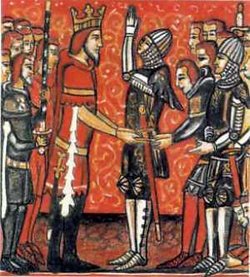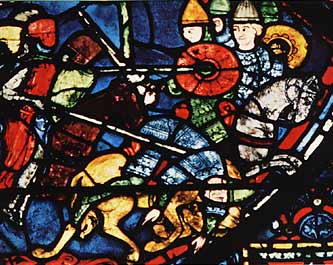3 Systems of Meaning in Roland's World
 Marilyn McCord Adams has observed that evils in life are not limited to questions of pain and morality. Roland, Olivier, Turpin, Charlemagne, Ganelon, and others are motivated and dominated by social systems that are concerned with honor and shame and, to a lesser extent, with a sense of purity and defilement. Likewise, the poem Song of Roland also establishes some of its moral meaning and reflection through aesthetic categories involving beauty and ugliness. These three sets of concerns help us further understand what guides the characters' actions and the poem's judgments:
Marilyn McCord Adams has observed that evils in life are not limited to questions of pain and morality. Roland, Olivier, Turpin, Charlemagne, Ganelon, and others are motivated and dominated by social systems that are concerned with honor and shame and, to a lesser extent, with a sense of purity and defilement. Likewise, the poem Song of Roland also establishes some of its moral meaning and reflection through aesthetic categories involving beauty and ugliness. These three sets of concerns help us further understand what guides the characters' actions and the poem's judgments:
I. Honor and Shame
Esteem and disesteem make up a serious component in the way we value our lives. “[T]he category of honor centers, not on the evaluation of deeds, but on the sacred quality of persons” (Adams 106-107), which is not to deny there is any relationship existing between conduct and honor. As a public and social system of regard, honor is something that is garnered because it is both owned by the person and given by the society. The emphasis, rather than being on the quality of the actions themselves, however, falls on the person in toto. We should not forget that symbolic systems of identity such as these are real matters of import. Honor and shame have painful implications. Loss of honor can result in real anguish and humiliation. Psychic pain is as real as physical pain, and at times even more important for how it deforms and even destroys human self-regard.
- Ascribed vs. Acquired Honor: Honor (or shame) takes both “ascribed” and “acquired” forms: the former is given because of a person’s birth, class, or station; the later results from highly regarded deeds or misdeeds (Adams 108).
- The Game of Challenge and Riposte: Honor and shame are often negotiated in verbal exchanges. A challenge requires a perception of the situation followed by a response—one of positive rejection, one of negative refusal, or one of accepting the challenge. The person is more willing to pass over the affront to honor if the person of lower station and therefore, not worthy of answering. Likewise, the person may refuse to address the affront and accept the shame acquired.
- Intention and Oaths: Oaths are often undertaken to remove any doubt about the person's sincerity of intention. Oaths, thus, become social pledges that test and either uphold honor or impart shame.
- Collective Honor and Headship: In a society organized around honor, individual honor is often tied to collective honor, especially the obedience and fidelity owed to the head (i.e. king, lord). Dishonor to one, in particular to the king, reflects on all in the collective, and it must be addressed as such.
- Patron-Broker-Client Systems: Social standing and its accompanying system of honor and shame is tied to markers of class--wealth, prestige, fashion, titles, land, occupation, family and heritage. Such systems call for a hierarchy, whether more static or more fluid. This creates a relationship of honor not only between the patrons at the top and the clients who serve them, but the brokers of class markers between them.
- Sharing in God’s Divine Honor: In such systems, the divine honor is attached to various ecclesial bodies, doctrines, leaders, and so on. Priests, for example, become brokers of the divine honor with the people.
Questions
- Is the honor of Roland and Ganelon primarily ascribed or acquired? Name some examples.
- How is the game of challenge and riposte present in the first sections of the poem?
- How are the Franks motivated by collective honor?
- How does Turpin function as a "divine broker" of God's honor?
- What role does revenge play in maintaining honor in the poem?
- What motivates Roland in not blowing the horn at first?
II. Purity and Defilement
Purity and defilement involve our sense of ourselves as "clean" or "unclean." To be unclean is to be cut off from the collective, as well as to be contaminated and therefore contagious. Holiness, too, implies a separation from what defiles, but it also suggests a power before which we are found wanting. In The Idea of the Holy, Rudolf Otto developed a nomenclature for this experience of the divine. He characterized the response of religious emotions to God in three broad categories:
- Tremendum involves a feeling of being overwhelmed, even threatened, by the active power and the plentitude of God’s being.
- Mysterium, on the other hand, rather than being repulsed is a sense of attraction, even stupor, before the fascinans of God’s wholly otherness, the totaliter aliter.
- Augustus amounts to a sense of profaneness and sinfulness before the holiness of God (13-17, 23-29, 50-57).
This set of categories suggests a way of understanding "sin" as something that not only a moral state needs to be purged, but also a social space that needs to be overcome. It involves some of the following categories:
- fear and dread before the Awfulness and Dreadfulness of God's Infinite Purity,
- creature-feeling before the plentitude of God's Being,
- a sense of a radical threat before God's living urgent action,
- angst and stupor before God's wholly otherness,
- attraction before the fascination of God's holiness,
- profaneness before the Holy,
- covenant, as an accommodation of the size gap between the divine infiniteness and our own finitude.
Questions
- Name some instances where the sense of purity and defilement is present in the poem, especially in the battles or the concluding trial).
- How do the fighters' actions address the potential sense of defilement?
- Why does their martyrdom purify them?
- How is Charles' sorrow over the heroes death "cleansed"?
- How does Ganelon's punishment act as a ritual defilement of a traitor?
III. Beauty and Ugliness
It may seem strange to think of the morality of an event termed as attractive or repulsive narrative shapes, but this set of values explains why we tend to be moved by certain kinds of exemplary stories. We contextualize our experiences; we give them a shape by the story we tell about them, and we make sense of them by placing them in certain received categories.
Peter Berger has argued that explanations of evil are necessary for social structures to stay themselves against chaotic forces. Berger observes that the order of human experience is also subject to great social and natural disruption. Social systems make sense of the world via a “meaningful order, or nomos” (19) and must adapt themselves to periods of disruption, or anomos. An individual’s capacity to survive times of great crisis is dependent upon the nomos’ ability to explain the pain or evil. “The socially established nomos may thus be understood [...] as a shield against terror” (22). It follows, then, that such an explanation has an impact on the whole person, for a person’s worldview, as well as self-concept, is tied to a certain coherent way of understanding reality. It gives one a sense of:
- how moral taste and dramatic perception give meaning to the horrors of life (e.g. war),
- how human survival is dependent upon some sense of the world’s order and goodness,
- how horrific evils deform and distort this picture of the world and life,
- how a divine narrative (vision of God, promise of heaven, testimony of martyrdom, etc.) gives a stable frame that tells a truth about good and evil.
 Questions
Questions
- How does the poem as a whole give a meaning to the experience of warfare? What virtues does it hold up as admirable?
- How does the poem address the sorrow of the various characters?
- Does the poem ultimately offer a pleasing aesthetic solution for its questions?
- How are the three sets of values addressed above intermingled in Song of Roland?
